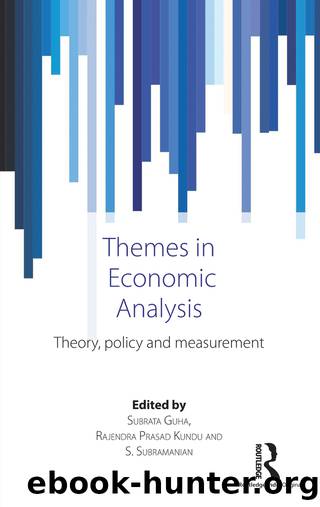Themes in Economic Analysis by unknow

Author:unknow
Language: eng
Format: epub
ISBN: 3570282
Publisher: Taylor & Francis Group
From our analysis it is quite evident that in the presence of ex post dual-sided asymmetry when parties employ a fixed price contract, none of the expectation measures awarded by the court nor even party-designed liquidated damage can achieve the first best. However, among all the considered measures, the liquidated damage measure performs better than the court imposed ones.
Conclusion
The earlier literature on the analysis of contract remedies for breach does not account for the non-breaching partyâs option to not sue for damages upon breach. They typically start the efficiency analysis of various contract remedies assuming, as given, that there will be litigation for breach of the contract. However, we have identified that the victim of breach might choose not to sue for remedy if the expected pay-off from the lawsuit is negative, given the contractual terms and her private information about her loss from breach. Our analysis has shown that this option of acquiescing to a breach as well as the non-observability of the partiesâ valuations and reliances together have important implications for incentives to both breach and reliance and the efficiencies of various contract remedies. Specifically, we have also pointed out that when actual expectation damages of the victim (although not directly observable to the breacher) can be verified later (at a cost) in the court, it will induce under-breach from the ex ante perspective. Lastly, we have also investigated the courtâs optimal choice of damages under the case of non-verifiable damages, where the parties engage in a strategic signalling game trying to present evidence strategically to influence the courtâs damages award. And our results have a twofold implication: first, when the parties do not specify any particular damage measure in their initial contract, the courts should adopt the expected expectation damage as this will augment the social surplus and to some extent curb the strategic behaviour of the parties, although this does not lead to efficient investments by the parties; second, in case the parties come up with some mutually agreed upon liquidated damage provision in their contract, the court should implement the same unequivocally, as the parties might be designing this damage provision either from the perspective of maximising the joint pay-off or from the perspective of implementing efficient levels of bilateral reliance investments.
* Based on a chapter of my doctoral thesis at JNU under the supervision of Prof. Satish Jain. It is my honour to contribute this essay for this book. I highly solicit suggestions from Priyodorshi Banerjee, ISI-Calcutta, and Abhijit Banerjee, DSE. All errors are mine.
Download
This site does not store any files on its server. We only index and link to content provided by other sites. Please contact the content providers to delete copyright contents if any and email us, we'll remove relevant links or contents immediately.
The Hot Zone by Richard Preston(1639)
Rigor Mortis by Richard Harris(1385)
How Innovation Works by Matt Ridley(1278)
Oxymoronica by Dr. Mardy Grothe(1220)
Mawson's Will by Lennard Bickel(1148)
Kathryn Bowers & Barbara Natterson-Horowitz by Zoobiquity(1108)
The Future of the Mind: The Scientific Quest to Understand, Enhance, and Empower the Mind by Michio Kaku(1093)
Bankrupting Physics by Alexander Unzicker(1082)
The Ghost Hunters by Deborah Blum(1058)
Statistics Done Wrong: The Woefully Complete Guide by Alex Reinhart(1049)
The End of Breast Cancer by Kathleen T. Ruddy MD(1008)
One Two Three ... Infinity: Facts and Speculations of Science by George Gamow(1005)
THE DEMON HAUNTED WORLD by Carl Sagan(1002)
Science Book by Big Ideas Simply Explained(964)
The Universe Speaks in Numbers by Graham Farmelo(960)
The Wizards of Langley by Jeffrey T Richelson(880)
Rigor Mortis: How Sloppy Science Creates Worthless Cures, Crushes Hope, and Wastes Billions by Richard Harris(869)
Biomimicry by Janine M. Benyus(857)
The Case Against Fragrance by Kate Grenville(836)
